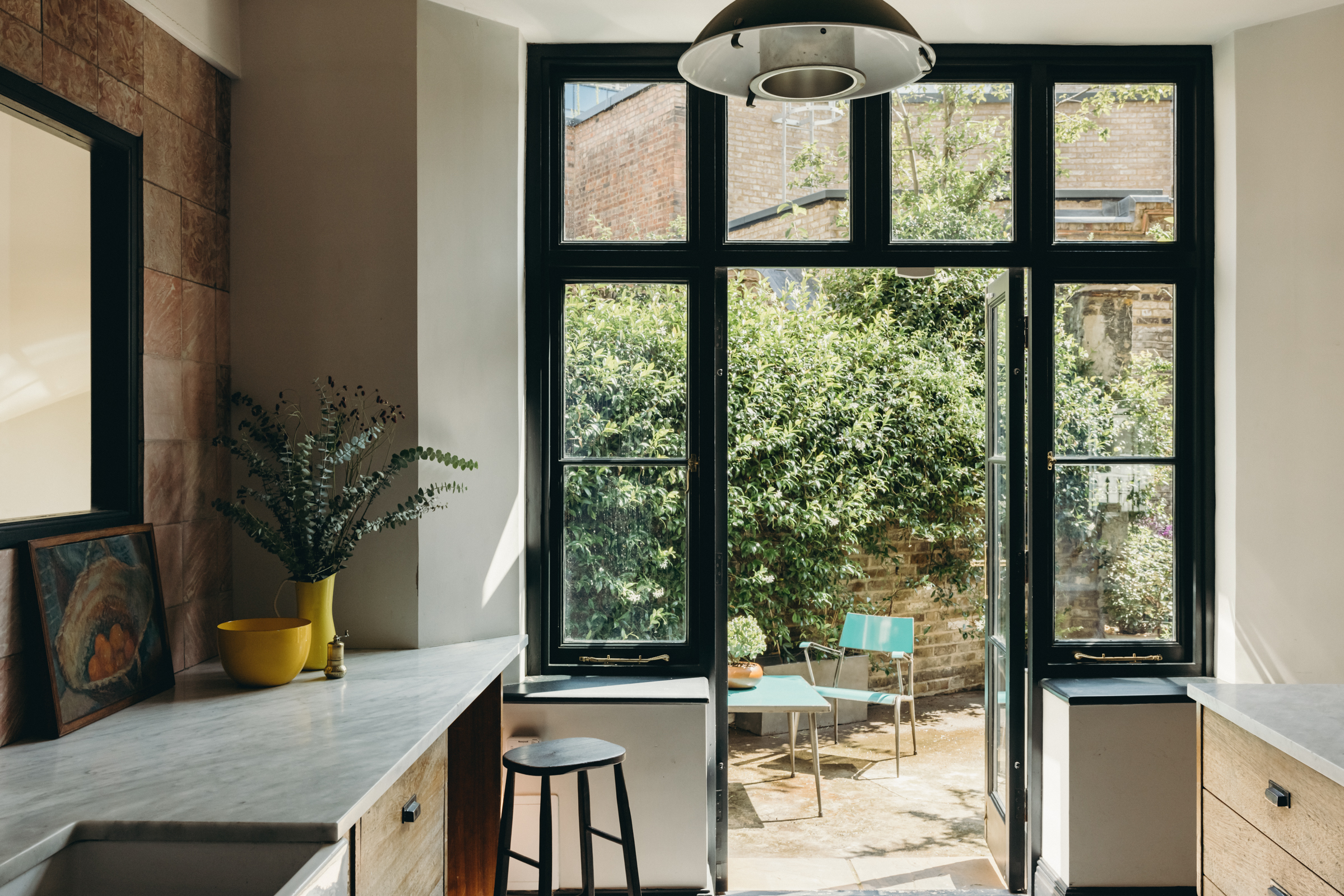The house has a simple façade of stock brick set in Flemish bond, with a dentil cornice at the second storey and relieved arches to the windows – round-headed at ground and first floor – and a mansard roof of Welsh slate with three barrel-roofed dormer windows. Set behind cast-iron railings at street level with its entrance at the adjunct on Ashby Street, a deep blue-painted door opens into a large central hallway with black and white chequered tiles underfoot. Pale, stone-coloured butt and bead panelling adds depth to the space, while Crittall-style glass and wood partitions painted dark grey are positioned to either side, separating the living spaces while allowing light to flood across the entire floor.
A study lies on the left behind glass wedding doors. This has a beautiful chimneypiece and wooden shutters, which encase all ground floor street-facing windows. To the right is the heart of the home: a capacious dining room leading to the kitchen, with views through French windows onto the courtyard garden and a wall of fragrant jasmine. A slate chimneypiece grounds the room, while tripartite sash windows allow light to envelop the space. A charming mix of reconditioned antique and replica cast-iron radiators feature. The kitchen houses plentiful cabinetry in rough-hewn oak with concealed appliances, Carrara marble worktops, a butler sink and a generous range stove.
Ascending the winding staircase from the hallway, windows on each landing bring a unique quality of light to the rear of the house. The deep wooden treads have been hand-sanded by a historic flooring specialist and left untreated to wonderous effect, as have the floors of all upper storeys of the house. The first-floor drawing room lies directly ahead, wrapping around the entire front of the plan. This is an exceptional space, with four full-height sash windows facing plane trees in the garden square, wonderful tall ceilings and excellent plaster cornicing. Two working fires with bullseye marble chimneypieces are positioned at either end of the room. A generous shower room encased in hand-glazed dark green metro tiles lies at the rear of the plan.
The second floor is home to the main bedroom, plus a secondary connected bedroom that could also be configured as a walk-in wardrobe or nursery. The beautiful en suite bathroom features a freestanding bath with easterly views over London rooftops, and a decorative Edwardian glazed chimneypiece (a later addition). Two further bedrooms are housed in the garret at the apex of the house, where the pitched roof and supporting beams have been exposed, lending a sense of space and character unique to this floor. The bedrooms have arched dormer windows and share a lovely shower room.
The lower ground floor contains two separate bedrooms, with ‘secret’ jib doors leading to under-street pavement vaults from each space. Lightwells at ground level draw light into the bedrooms from the front of the plan. There is also a separate shower room and utility room. This floor is particularly useful, possibly for a nanny, older children requiring a degree of independence, or as separate office spaces.
The Great Outdoors
The east-facing courtyard garden is brilliantly positioned to enjoy the morning sun and is extremely private and quiet. Wonderfully easy to maintain, it is also perfect for alfresco drinks or supper in warmer months.
The gardens of Northampton Square were originally created for the sole use of residents but were finally opened to the public in 1885. The famed landscape gardener Fanny Wilkinson – who designed many of London’s most important garden squares – redesigned the gardens in 1935 to the more circular layout seen today, including a drinking fountain to commemorate the 1885 opening to the public, as well as a charming bandstand, refurbished in 2011. The much-loved Café Fiori now occupies the old park keeper’s lodge within the square, serving excellent sandwiches and coffee to residents.
Out and About
Northampton Square is brilliantly located, equidistant from Islington to the north and Old Street to the south. It is on the periphery of an area renowned as a hub for the creative, design and tech industries, and for the quality and variety of its bars and restaurants. Upper Street is a short walk away, as is
Exmouth Market, with firm local favourite restaurant
Moro being among the original inhabitants of the street.
St Paul’s Cathedral,
Smithfield Market and the City are within easy reach to the south of the square. St John Street has a convenient Waitrose, as well as the famous
St. John restaurant. Additionally, the
Barbican Centre, with its world-class cultural programme of cinema, music, theatre, talks and exhibitions, is a few minutes walk away.
Angel is the closest tube station – less than five minutes walk – and runs Northern Line services citywide. Nearby Farringdon station (Circle, Metropolitan and Hammersmith & City Lines, and National Rail/Thameslink) provides quick access to locations across London and, as of 2022, Heathrow Airport, care of the forthcoming Elizabeth Line (Crossrail). Journey times to main terminals will be less than 30 minutes. The Eurostar is available at King’s Cross St Pancras, a five-minute drive away from Northampton Square.
